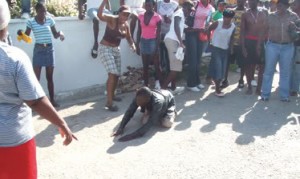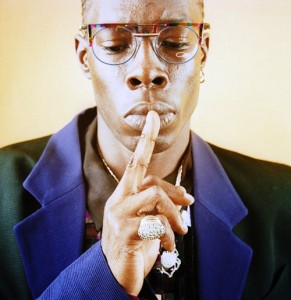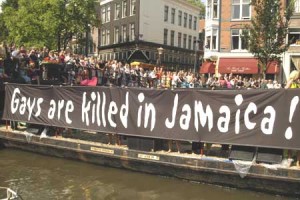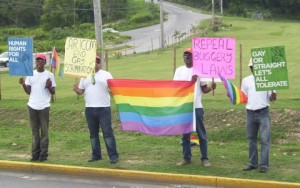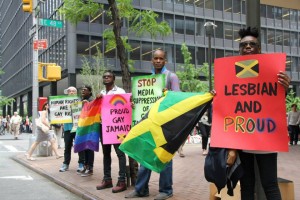Human Rights
The Inter-American Commission has been charged with investigating “citizens’ security” and its relationship to human rights. The commission which is a part of the Organization of the American States utilizes petitions, case studies, thematic reports, country reports based on local visits made to the region and hearings held during its session into their investigations of alleged human rights abuses. This report is a 3 years investigation on the situation of human rights in Jamaica. Major areas of concern within this report are the right of women, the rights of children and discrimination based on sexual orientation and gender. In addressing the issues of discrimination based on sexual orientation the commission met with representatives of different sectors of civil society, including Jamaicans for Justice, the Independent Council for Human Rights, and the Jamaican Forum for Lesbians All-Sexuals and Gays (J-Flag), etc. The commission also met with religious leaders and held hearings to attest the validity of sexuality discrimination cases. The commission came to understand that discrimination based on sexual orientation, gender and gender expression is widespread in Jamaica and that discrimination against gays, lesbians, bisexual, trans and intersex individuals, along with individuals infected with HIV/AIDS is entrenched within Jamaica’s, political, economic, social and cultural systems. The commission’s position on human rights in Jamaica is that, “Jamaica is failing to take an active stand against sexuality based discrimination; the state is failing to respect and protect the rights of those targeted” (96). Additionally, Jamaica has continued to defend and uphold some of the world’s most stringent anti-sodomy laws while adopting homophobic music for their political campaign. The Jamaican government stance has continued to be that there have been no credible cases of sexuality based discrimination to date and that there has been no proven case of murder or abuse of Queer Jamaicans or even reports of “gay bashing.”
All Commonwealth Caribbean countries except The Bahamas continue to criminalize the LGBT community. The laws which criminalize the LGBT community in the majority of the commonwealth Caribbean countries are a product of previous colonial legislation which is still in force. Most Caribbean countries use the 1861 Offences Against the Person Act as a means of criminalizing the LGBT community or have penal codes that contain ‘sodomy’ provisions similar to those found in the Offenses Against the Person Act. This spread sheet is put together by the Commonwealth Human Rights Initiative and details the various laws in each nation that seve to oppress the LGBT community.
United Nations Information Centre for the Caribbean Area
The UNIC opened its doors in Port of Spain on 18 January 1962, mere months before the independence of Jamaica and Trinidad and Tobago. UNIC Port of Spain is part of a global network of 63 UN Information Centres around the World. They represent the field offices of the United Nations Department of Public Information, which was created, because the then Secretary-General of the UN, felt that it was important that the story of the UN and its work be told to the peoples of the world.The UNIC performs different functions in the Caribbean. Its activities are guided by three pillars – Human Rights, Peace and Security and Development/Climate Change.
A Briefing to the European Union
The HIV and AIDS epidemic in Latin America and the Caribbean (LAC) represents a serious threat to the health, development and security of millions of people. The Caribbean sub region comes second in prevalence of HIV and AIDs and the number of people living with HIV in Latin America and the Caribbean increases steadily year on year, growing form 400,000 in 1990 to 1.64 million in 2009. The bulk of HIV and AIDs in the region is concentrated in transgender (trans) people, men having sex with men (MSM), and sex workers. These most-at-risk groups and other vulnerable groups often face a double vulnerability to both the disease and to social rejection and discrimination all over the world.
The Pan American Health Organization (PAHO), founded in 1902, is the world’s oldest international public health agency. It provides technical cooperation and mobilizes partnerships to improve health and quality of life in the countries of the Americas. PAHO is the specialized health agency of the Inter-American System and serves as the Regional Office for the Americas of the World Health Organization (WHO). Together with WHO, PAHO is a member of the United Nations system.
Homophobia, Violence and Jamaica’s HIV/AIDS Epidemic
Jamaica is at a critical moment in its efforts to address a burgeoning HIV/AIDS epidemic. An estimated 1.5 percent of Jamaicans are living with HIV/AIDS, and HIV/AIDS is on the increase. Jamaica’s Ministry of Health has taken steps to combat discrimination against people living with and at high risk of HIV/AIDS (such as men who have sex with men and sex workers), which it has recognized as a key factor driving Jamaica’s HIV/AIDS epidemic. Its national HIV/AIDS program has fostered important relationships with nongovernmental organizations with established links to marginalized high-risk groups, provided support for their HIV/AIDS work with them, and looked to them for guidance in developing an effective response to the epidemic. It also has provided HIV/AIDS training for health personnel addressing stigma and discrimination.
Music
Reggae has been shaped and reshaped by transnational migratory movements of people, music and ideologies. This essays is an historical overview of the of Reggae musical genres (Dancehall, Raggeaton, etc.). This is accomplished through an analysis if the shifting and changing forms of the music which is being produces, as well as how the music is articulated through social and cultural movements by exploring its existence in time and space. Dem Bow (1990/91), a song recorded by Shabba Ranks is understood as one of the first hits songs that’s fueled the popularity of Dancehall music movement. With regards to the lyrics of this song, it calls for not “bowing” down to oppression, explicitly towards pressures from foreign entities which bring “deviant” sexual practices such as oral and anal sex along with homosexuality. This song highlights Jamaica’s remarkable ubiquitous voice as it pertains to homophobia. Dem Bow was one of the first songs that gained much attention form international human rights groups and LGBTQI organizations. In the U.S., Europe and Canada sympathetic groups have called for the boycott of this type of music, along with its performers and promoters. Following Shaba Ranks, many Dancehall artist have refused to apologize for the homophobic lyrics of their songs, this article suggest that artist are less inclined to apologize in fear that they my loose “street credibility” in their native communities in Jamaica. The author further argues that Dancehall and reggae in its newest forms are moving away from the anti-gays lyrics and sentiments to a more machismo driven objectification of women.
- Sanneh, Kelefa. “Bring in the Reggae, Hold The Hate.” New York Times [New York] 27Aug. 2007: n. pag. Print.
The Reggae Carifest is a yearly festival celebrating reggae music. Over the years, due to the usual Dancehall artist line up it has been viewed as quite controversial. Nevertheless, the year of 2007 saw the Gay & Lesbian Alliance Against Defamation (GLAAD) organized a massive protest against this festival. The apparent choice of Buju Banton and Bounty Killer as the festivals headliners created a world wind of anti-homophobia protest. These two artists are regarded by many LGBTQI organizations along with Shabba Ranks, as the “ring leaders” of the Jamaican anti-queer music culture. GLAAD brought so much attention to their presence that power 105. FM, a hip-hop radio station, the festivals biggest sponsors pulled out. After all the activity by GLAAD the festival which took place on Randall’s Island was scarcely attended.
Monroe, Kerran, January 14th, 2014
Dancehall superstar Sizzla banned for life from Sting, one of Jamaica most popular annual music showcases. The Jamaican Tourist Board who is one of sponsors of this which showcase the musical talent that exist on the island. The event is seen as a major opportunity to bolster Jamaicans tourism opportunities. Sizzla, a self proclaimed homophobe, was warned before the concern not to use homophobic hate speeches in is performance but when he ignored this warning the Jamaican Tourist Board and The Sting concert organizers banned Sizzla from taking a part in this cultural presentation for life.
Songs and Lyrics
In the beginning, I thought there were only a few of these hatred songs released in Dancehall music. How little did I know…
The more I searched the Web, the more I discovered. In total, 207 songs are exposed on this page, with lyrics when available. Although I think I could have come up with another hundred easily, the following list seems to include the most popular ones.
By Ilan Greenberg
December 1, 2010
Jamaica’s dancehall music is being blamed for the country’s violent attacks on gays. But there are many who don’t see the music as homophobic, only the battle cry of a changing nation. Read part 2 of this article here.
To illustrate how conditions really are for LGBT people in Jamaica, I have urged people to watch a YouTube video that features the photo above. While looking at the above photo, you listen to a very homophobic, “kill LGBT,” song.
Alexis Petridis
The Guardian, Thursday 9 December 2004
Their gigs have been cancelled all over the world and their names withdrawn from awards. But Jamaica’s dancehall stars refuse to apologise for – or even stop singing – songs that encourage the murder of gay people. Alexis Petridis travels to the Caribbean and discovers a culture that can’t see a problem, let alone a solution
published: Tuesday | October 5, 2004
Donna P. Hope, Contributor
In recent months, particularly since the death of noted gay activist Brian Williamson, gay activists, led by Outrage, have been falling over themselves to fill international media houses with anti-dancehall propaganda. Dancehall music is labeled ‘hate music’ and ‘murder music’ in an international context where the term ‘hate speech’ has very negative connotations.
By Leah Nelson
Jamaican dancehall star Buju Banton was considered a musical prodigy in 1988 when, at age 15, he recorded what remains one of his best-known tracks, “Boom Bye Bye.” Even in the difficult-to-decipher Jamaican slang known as patois, its chorus evokes violence and dread: Boom bye bye / inna batty bwoy head / Rude bwoy no promote no nasty man / dem haffi dead. (“Boom [the sound of a gunshot], bye-bye, in a faggot’s head / the tough young guys don’t accept fags; they have to die.”)
By Foster Kamer | Sep 3, 2013
In the continuing series of facepalm moments that is the race to become New York City’s next mayor, much has already been made this morning of Democratic candidate Anthony Weiner’s appearance at the West Indian America Day Parade. The parade, often noted as New York City’s largest, goes well through Brooklyn, and is always a jubiliant, raccous party. Of course, during an election season, it becomes yet another thing for candidates to walk through and show their “support” for the community they’re marching with.
Video First broadcast in 2007: Is Jamaica the most homophobic country in the world? Does reggae/dancehall “murder music” contribute to anti-gay violence? Stop Murder Music campaigners, Dennis Carney of the Black Gay Men’s Advisory Group, and Brett Lock of the gay human rights group OutRage!, discuss with Peter Tatchell.
Eight leading Jamaican reggae/dancehall stars, including Buju Banton and Beenie Man, have sung songs openly advocating, encouraging and glorifying the murder of queers.
July 31, 2006
Songs with homophobic lyrics?
Looking for songs with homophobic lyrics. no, not for a mixtape, ew. But for my own curiosity and independent research, what songs out there have lyrics that,
perhaps at the time, were just written oh so casually, but our more enlightened age knows better. (Which sort of rules out Eminem-style “watch me be shocking” stuff from my question, but I suppose it’s a gray line)
19 October, 2013
Giuliano Ferla
It’s last Thursday night and my friend Hanna and I are going to Fusion Studio in Fitzroy to learn how to dance dancehall. I’d done my research. I’d seen the YouTube videos of hypersexual women, shaking themselves all over so that they wobble and wiggle provocatively. I’d watched barely clothed and jiggly Jamaican women grinding up against sweaty, athletic Jamaican men. I had looked surreptitiously over my shoulder to make sure no one was watching me watch these videos, because they’re pretty much porn and it’s all pretty arousing. Anyway, I asked Hanna to come along to the class, mainly because I knew there would be a majority of, if not all, girls there. I thought that if I brought along a girl then that would add some kind of legitimacy to me being there. Like, maybe if I brought a girl I would present as a non-threatening male who was there to dance and not to perve on girls. If I’m going to be honest though, I brought Han along for one more reason. You know, the dancers are so sexually aggressive and like a lot of guys, I am both turned on by women who are sexually aggressive, and intimidated by them. I brought Han along because I was a bit scared.
posted by Luiz DeBarros | March 26, 2014
Zimbabwean reggae and dancehall performers have started publicly expressing anti-gay views to their fans, emulating some of their infamous international counterparts.
Jamaican artists in the genre have come under fire for their homophobic performances and song lyrics since the early 1990s.
by robk007 on May 21, 2012
Late last week, Beenie Man made headlines around the world by releasing a statement on YouTube that was billed as a “video statement” but has been universally described as an “apology.” Listen keenly and see if you hear the word “sorry” or “apologize”… Beenie Man Video Statement.
Newspaper
In this article Tim Pagett is asking the question, is “Jamaica the most homophobic place on earth?” He opens his article with an interview with Brian, a 44 years old Queer Jamaican man, who along with 5 other men was viciously “gay bashed” by Dancehall singer and superstar Buju Banton. Brain alleged that Banton, whose recording studio is near his house, attached him and his friends, beating them with boards and kicking them in the face. Brian has lost the use of his left eye due to the beating he received. Buju Banton an avowed homophobe most famous song Boom Bye-Bye (1993) calls for the murder of gays, the songs say “Battyman haffi dead” (“gay men have to die”). After pleads from international human rights organizations Banton was placed on trial for the beating of Brain and his friends but the judge threw the case out on the grounds of lack of evidence. Buju Banton is currently banned from entering the United States, Canada, Britain and other European countries due to the extreme homophobic nature of his lyrics and the fact that he calls for violence against Queer people in his songs. Homophobia has seeped into all aspects of Jamaica’s civil and political institutions. Many gay-rights activist have called for a boycott of not only Jamaican music but traveling to the destination as well. Bantons lyrics are hardly unique amongst Dancehall artist today, many artists of this genre have called for the killing of gays, such as Elephant Man, who declares in one of his songs, “When you hear a lesbian getting raped/ It’s not our fault … Two women in bed/ That’s two Sodomites who should be dead.” Another, Bounty Killer, urges listeners to burn “Mister Fagoty” and make him “wince in agony.”
By Zoe Mintz
on August 09 2013
When Maurice Tomlinson heard his son had made it to the spelling bee championships, he wanted to witness the 12-year-old take the prize. But his sexuality got in the way. The 43-year-old Jamaican-born father wanted to visit his son in Belize but knew he’d be breaking the law if he tried. In a statute dating to the 19th century, during the country’s colonial past, homosexuals are lumped in with prostitutes, the “mentally deficient” and the “deaf and dumb,” all of whom are prohibited from entering the country.
Posted on 30 Mar 2012
With the arrest of two men on an Atlantis cruise in the harbor in Dominica, the question isn’t whether they were having sex, as police claim, or just sunbathing nude, as the couple claims. The question is why a gay cruise is visiting islands where homosexuality is illegal, rewarding these places with tens of thousands of dollars of purchases on each visit when there are more places in the Caribbean where homosexuality is legal and places that even recognize same-sex marriage.
By Annecka Marshall is a lecturer in the Institute for Gender and Development Studies at the University of the West Indies at Mona, Jamaica.
Jamaica and some other parts of the Caribbean have seen a pattern of homophobic violence, instead of the shift toward acceptance in much of Latin America. This fact challenges anyone who wants to deny the stigmatization, discrimination, verbal and physical abuse of lesbians, gays, bisexuals, transgender, queer and intersex persons. So what is the cause of anti-gay feelings in Jamaica?
By Dalia Acosta
While homosexuality is punishable by law in nine Caribbean island nations, gay activism is increasingly taking root in countries like Cuba.
“The situation in the Caribbean today is one of contrasts,” Gloria Careaga, co-secretary general of the International Lesbian, Gay, Bisexual, Trans and Intersex Association (ILGA), founded in 1978 and with close to 700 member groups in over 110 countries, told IPS.
Differences are greatest between the Spanish-speaking and English-speaking areas of the Caribbean, Careaga, a Mexican psychologist who is also in charge of the Latin American and Caribbean region (ILGA-LAC), said by email on the occasion of International Day Against Homophobia and Transphobia, Tuesday May 17.
- Gay Jamaicans launch legal action over island’s homophobic laws
Landmark case seeks to abolish colonial-era ‘buggery’ laws and stop murders and violent attacks on Caribbean homosexuals
Owen Bowcott and Maya Wolfe-Robinson
The Guardian, Friday 26 October 2012
Two gay Jamaicans have launched a legal challenge to colonial-era laws, which in effect criminalise homosexuality, on the grounds that they are unconstitutional and promote homophobia throughout the Caribbean. The landmark action, supported by the UK-based Human Dignity Trust, is aimed at removing three clauses of the island’s Offences Against Persons Act of 1864, commonly known as the “buggery” laws.
November 5, 2012 · By Staff Writer
The countries of the Caribbean are, as it’s said, divided by sea, but united by culture. It is in the spirit of recognizing that many state-local issues in a single Caribbean state can have regional impact and significance that I write this column about a recent incident in Jamaica.
caribbean360.com – Tuesday, May 17th, 2011
While homosexuality is punishable by law in nine Caribbean island nations, gay activism is increasingly taking root in countries like Cuba. “The situation in the Caribbean today is one of contrasts,” Gloria Careaga, co-secretary general of the International Lesbian, Gay, Bisexual, Trans and Intersex Association (ILGA), founded in 1978 and with close to 700 member groups in over 110 countries, told IPS.
– Presented by: The Aol. On Network
Homophobia reached new heights in some regions of the Caribbean with harsh laws against the gay community. 11 countries have anti-sodomy laws while 2 countries have banned entrance to their nations if the person is gay.
Organizations
J-FLAG is the first human rights organisation in the history of Jamaica to serve the needs of LGBT peoples and over time it became the first port of call for the media, resulting in J-FLAG assuming the role of the mouthpiece for the LGBT community.
J-FLAG is a Non-Profit NGO that is in the business of promoting social change in furtherance of the well-being of the members of the LGBT community, through a range of internally directed and externally focused tools including: Public Education, Crisis Intervention and Empowerment; Research; Rights-based Advocacy; Legal Aid and Legal Reform.
IGLHRC’s Latin America and Caribbean Program fights for an end to human rights violations based on sexual orientation, gender identity and gender expression and provides support for the sexual rights movement in the region. Many Caribbean countries have laws criminalizing same-sex acts. And while some Latin American countries, including Colombia (1980), Ecuador (1997), Mexico and Chile (1998), Puerto Rico (2004) and Nicaragua (2007), have decriminalized consensual intimacy between same-sex couples, countries such as Argentina still criminalize gender expression. Our staff partners with activists throughout the region to identify and implement strategies that promote sexual rights and to work for the repeal of discriminatory laws.
In response to all the negative criticism towards Danchall music from Human Rights and LGBTQI Rights organizations alike, one artist, Boom Viniyard, has been firing back. He has asked the questions, “Why isn’t the gay community rallying and protesting for the banning of the bible, since the bible teaches that homosexuality is a sin.” He has suggested that if LGBTQI organizations rally against and support the banning of Dancehall music then it makes sense that they should do the same against the church and conservative political parties. This is what he calls the “Homosexual Hyprocrisy,” the call for banning artist like Shabba Ranks, Buju Banton, Sizzla Kalonji, who are notorious homophobes, is taking away their freedom of speech, he says. While in contrast, the church and conservative political parties that condemn homosexuality openly and are actively working to oppress Queer people are left to operate without restrictions.
Founded February 14th 2010 by a group of lesbian and transgender individuals and straight allies with some thirty years experience combined to address the then invisibility of said groups in the general sphere of representation on community issues and TBL advocacy. Aphrodite’s PRIDE. operates as a Non-Profit Organization in Jamaica focusing on issues as they relate to the Jamaican Lesbian, Transgender (M→F & F→M) and Female Bisexual (LTB) Communities. Their mission is to create an environment conducive to positive intra and inter-community relations, encourage personal development (AGENCY) and improve self-esteem and create behavior change. We hope to achieve this by utilizing various methods of engagement and interventions.
ILGA strives to educate and raise awareness of the issues confronting our global neighbors in the LGBTI community. You can contribute to this effort by sharing your local lived experiences with others on the ILGA website.
Overlooked and at Risk: Lesbian, Gay, Bisexual and Transgender Youth in the Caribbean
The Caribbean region is made up of twenty-seven territories, with a population of 35 million people of which approximately eight million are youth between the ages of 10 and 24.[1] Located southeast of the Gulf of Mexico and North America, the Caribbean boasts a diversity of languages and cultures. Lesbian, Gay, Bisexual and Transgender (LGBT) individuals living in the Caribbean have had a long struggle for acceptance and equal rights within society. Many countries have laws against “buggery/sodomy”, “gross indecency,” or homosexual behaviour. Socio-cultural and religious taboos in many countries deny the existence of LGBT individuals and discourage any tolerance for their diverse sexual orientations and gender identities, regarding them as a threat to deep-rooted social norms of heterosexism and heteronormativity. LGBT people, including LGBT youth, undergo significant levels of stigma and discrimination and in extreme cases, acts of violence, which sometimes result in death. For the health and well-being of these young people, activists must work to end homophobia and transphobia in the region.
Social Media
